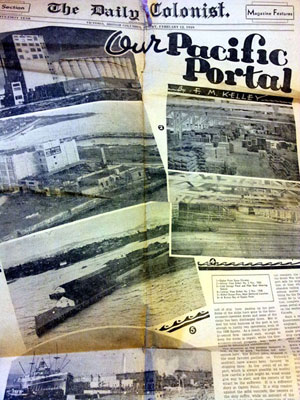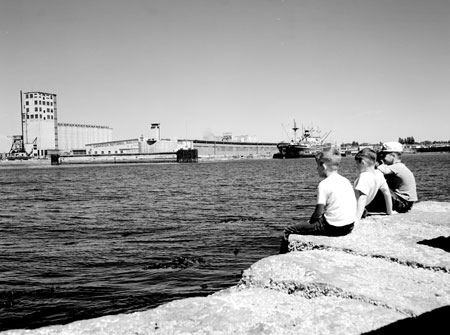Oct
14
Eyewitness to Ogden Point History
Oct 2013
By Doreen Marion Gee
Do you recognize me, Doreen? I sensed a familiar sparkle in those cheeky brown eyes. It's Billy. What a thrilling flashback to my childhood! After a lapse of fifty years, my brother's constant sidekick was standing before me - little Billy, the wild child, fun-loving and spunky. Since you are a writer at the James Bay Beacon, I have something for you. He handed me a 1939 article about Ogden Point. To a politics and history junkie like me, this was pure gold, solid and true.
That wonderful old yellow newspaper has been a source of unending fascination for weeks: "The Daily Colonist", Sunday, February 12, 1939. "Our Pacific Portal," written by F. M. Kelley, occupies a whole page and shows spectacular photos of the old Ogden Point Grain Elevator, Cold Storage Plant, Pilot Boat Mooring area, Rithet Ocean Piers, and a room full of crates and bags full of who-knows-what. The pictures show a gargantuan operation at Ogden Point in those days, a bristling, actively busy and very important international port of call.
wonderful old yellow newspaper has been a source of unending fascination for weeks: "The Daily Colonist", Sunday, February 12, 1939. "Our Pacific Portal," written by F. M. Kelley, occupies a whole page and shows spectacular photos of the old Ogden Point Grain Elevator, Cold Storage Plant, Pilot Boat Mooring area, Rithet Ocean Piers, and a room full of crates and bags full of who-knows-what. The pictures show a gargantuan operation at Ogden Point in those days, a bristling, actively busy and very important international port of call.
The old Colonist story is Kelley's heart-rending and poignant account of the downhill slide of a once world-renowned port. He sadly laments its slow fall from glory. Any history buff knows how the once proud seaport at Ogden Point, host to international trade for years, deteriorated over time, slumping into a stark idle cement wasteland. A native James Bay-ite, I find it utterly fascinating to read one version of whyithappened, straight from someone who was there.
The article's author mentions Rudyard Kipling's love of Victoria, alluding to his famous quote: "To realize Victoria you must take all that the eye admires in Bournemouth...the Isle of Wight and Happy Valley of Hong Kong, the Doon, Sorrento and Camps Bay, and add reminiscences on the Thousand Islands, and arrange the whole around the Bay of Naples, with some Himalayas for the background." Then Kelley states: "But I can also imagine that he (Kipling) would probably lose all the enthusiasm which prompted the former description if he had to land and spend any time on the local pier." Kelley is despondent about the formerly glorious port: "It is persistently slipping." Referring to a past brisk sea-borne business, he glumly states, "How Victoria lost it, is modern history too." Kelley puts himself in the shoes of a traveller entering the port: "Everything looks so down at heel. Victoria must do something to remedy the condition which exists in connection with the ocean docks."
 |
| Image I-26881 courtesy of the Royal BC Museum, BC Archives |
Kelley knows his stuff, quoting figures from 1928 to 1938 showing the number of ships arriving at Rithet's wharves reduced by two-thirds and registered tonnage halved - all within a decade. He blames the Federal Government, who took over part of the docks' private operations. There was not enough shipping business for the two competitors, making it very difficult for either to survive: "As a result, the privately-owned firm cannot earn enough to keep the docks in repair, while the Government-owned property has been allowed to deteriorate considerably. It is only a question of time when passenger ships will abandon calling here entirely." Kelley's solution was simple: Those who caused the problem (the feds) should take over and fix it. Nowadays, the Ogden Point lands have taken on a new personality - scenic tourist destination. Many beautification projects have turned dull into splendid.
The ghosts of my past still beckon through the restless mists of the Breakwater: jumping over piles of wood, running along the beach, watching a red sun set over ships from never-never lands. I can still hear my brothers' laughter - and my own. Whatever happened at Ogden point over the years, it is always special and beautiful to me.
As Billy Andrews recalls, "I remember climbing to the top of the grain elevator!" Thank you, Billy, for giving me a piece of history to keep and treasure.
